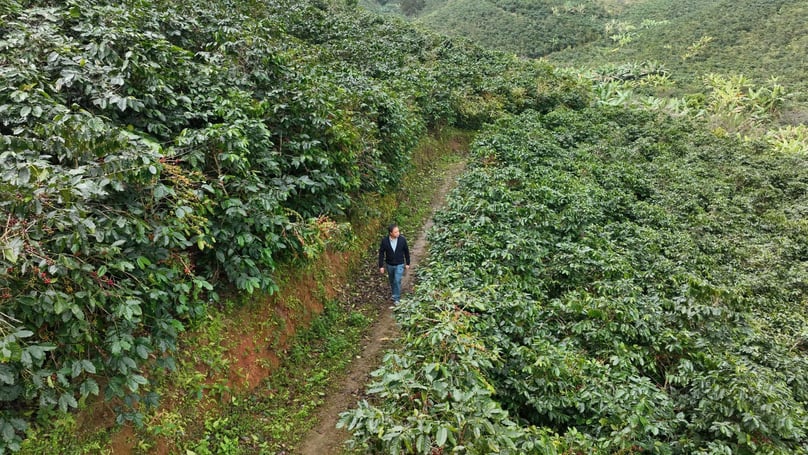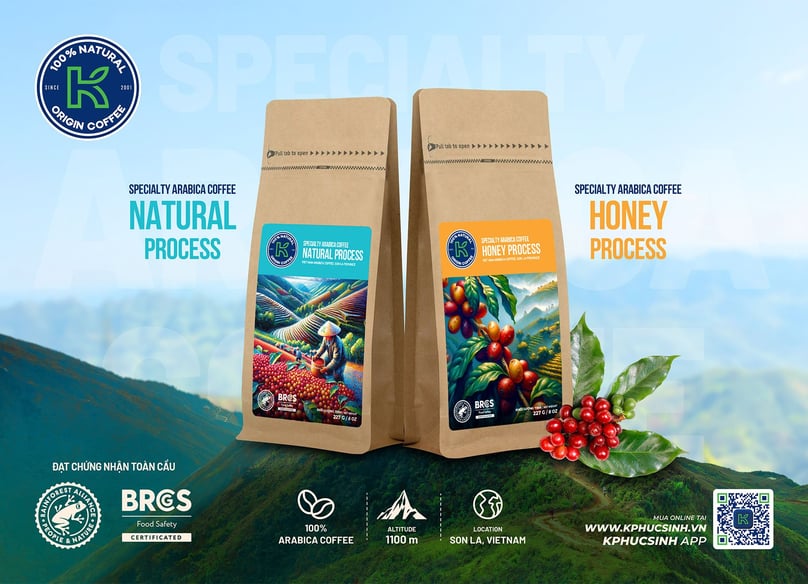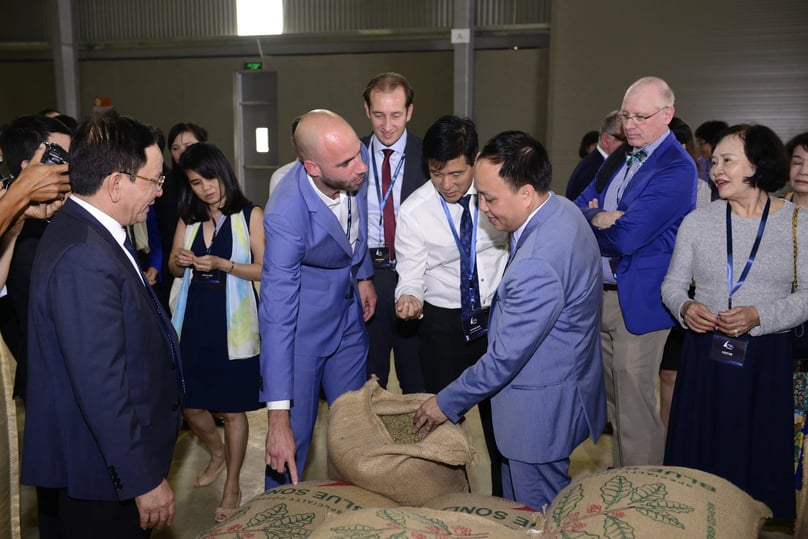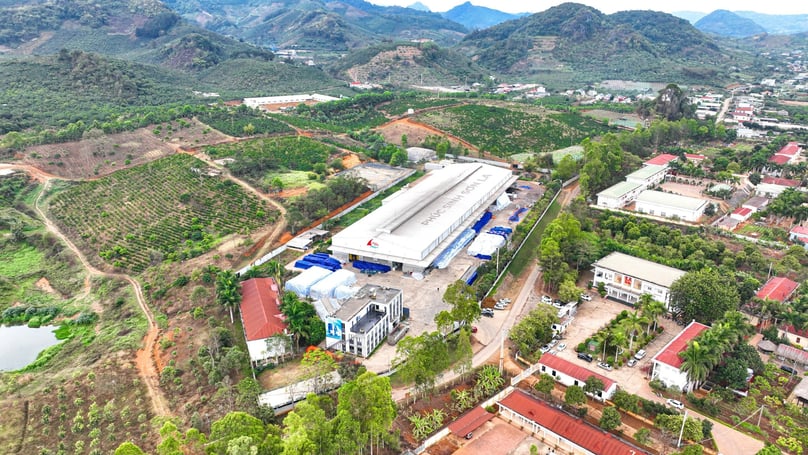Son La province: bumpy roads but lots of love for arabica coffee
Arabica coffee grown in the northern province of Son La has become popular across Vietnam thanks to its delicious, aromatic notes and consumer confidence in its quality, writes Phan Minh Thong, general director of Phuc Sinh Group.

Phan Minh Thong, general director of Phuc Sinh JSC, surveys coffee plantations in Son La province, northern Vietnam. Photo courtesy of Phuc Sinh.
We arrived in Son La province late one evening about seven years ago. It took over six hours to drive the difficult route from Hanoi to Son La, and even though the roads were uneven with sharp turns and steep passes, the cool temperature that greeted us immediately revived us.
We found an excellent restaurant thanks to a recommendation from my travel companion who studied in Son La. We spoke enthusiastically and ate with enthusiasm, but I couldn't help but notice that everyone else was talking about Son La coffee. It's true that when I first arrived, I was taken aback to see how much coffee was growing on the hillsides.
At that time, Phuc Sinh Company had two coffee factories in Dak Lak province and Binh Duong province, where there was always fierce competition for raw coffee beans.
In Son La, there were no factories, so we decided to survey the area, learn about this land, explored the different coffee varieties, and, naturally, tried the drink itself. We settled on green beans, which we roasted, brewed, and drank. The coffee was delicious and I was immediately convinced.
The plantations were large enough to sustain a factory, and I especially liked the taste of Son La coffee. However, I kept this idea to myself, thinking that we could buy land and build a factory. However, the idea came and went, and I was left undecided.
In the evening, we left Son La and continued to Sa Pa town in Lao Cai province, a place I had never visited before. Sa Pa was busy but in a bit of state. The roads had not been resurfaced for some time, and there were large potholes in the middle of the town.
Sa Pa is cold, and when it's cold, eating grilled meat and drinking beer is the perfect winter warmer. We spent 1.5 days in Sa Pa, and on the last evening we sat and talked. We had been friends since high school, so we were happy to be together and spoke quite frankly. I asked him if he wanted to become an owner and build a factory in Son La. Surprisingly, he nodded.
Actually, he had worked in banking for 22 years and had risen to the position of northern regional director, but at that moment he was ready to take me up on my proposal. I thought he was very brave.
But that's life. Everyone has to choose what they want, but we must deliberate carefully before doing so.
After his nod, I got started on my plan. We brought Son La coffee to Ho Chi Minh City to roast and taste, and we sent people from HCMC to Son La to survey and learn.
Fortunately, we were able to connect with the leader of Son La province. At that time, Hoang Van Chat was Secretary of Son La's Party Committee. Chat, along with other Son La officials, used to attend Central Highlands coffee festivals in search of investors from the south, and invite them to invest in Son La coffee. By chance, we met and completed a survey to build our factory.

Specialty arabica coffee of Phuc Sinh Group. Photo courtesy of Phuc Sinh.
During construction, my office was in charge of selecting contractors and deciding where to source equipment from. It occurred to me that why not use machines from Colombia and Brazil, as well as engineers from those famous coffee-growing countries. Buying their machinery and technology would make it easier for us to process quality produce and boost sales.
So we started looking for contacts. Fortunately, I knew an American guy working in Vietnam. He gave me a company name and address to contact. Everything went faster than I had expected, and in the end, we chose machines, engineers, and technology from Colombia for the project.
It is important to note that we experienced a wide range of perspectives during the project's implementation, both inside and outside the company. Upon learning about our investment, some coffee processing enterprises in Son La expressed their disapproval and even tried to stop us. They spent hours on end lobbying us to dissuade us from investing. Because they were working on Son La land, they shared those anecdotes with a number of local authorities, which made a lot of people doubt our project.
Fortunately, Chat still trusted us, and promoted us internally so that we could complete all the necessary legal procedures to build our factory. Ten months after the official start, we opened the Phuc Sinh Son La Arabica Coffee Factory on November 8, 2018.
The opening day was a big festival for the province because so many international visitors as well as friends in the coffee industry came to gather and celebrate. We were filled with pride, and confident that things would grow. A few friends, who were also buyers, promised to assist us with contracts. Some buyers, after visiting the factory and tasting the products, were converted, and said we must raise the price because the quality of coffee had really improved.
The factory also showed that if the project was enthusiastically supported by provincial leaders, even through complications and difficulties, problems related to importing equipment and people from different countries would not be an issue.
However, this was just the beginning.
Actually, we traded mainly robusta coffee, while arabica had very little output. Arabica quality in the south was erratic and had gained little trust among customers. Arabica selling prices were often low because there was a lack of confidence in the quality. Building our own factory was a way for us to dispel that myth.
However, arabica is extremely difficult to market. Arabica coffee is a slightly haughty and opulent kind with a centuries-long history. Arabica coffee vendors need to be well-versed in it and handle production with care and consideration. For us, this was rather new. When Phuc Sinh began producing Vietnamese Arabica coffee, there were certains areas that we needed to master, even though we were using Colombian production lines, technology, and machines.
Before we arrived, Son La arabica coffee was cheap. In fact, local dealers told us that Son La arabica was so infrequently accepted by consumers that they had to blend it with robusta beans from the Central Highlands in order to sell.

A large number of international customers have expressed interest in Son La arabica coffee. Photo courtesy of Phuc Sinh.
Arabica coffee processed by Phuc Sinh and the Colombian connection simply made Son La arabica coffee taste better and cost more than arabica processed in the old-fashioned way. This was really challenging because our buyers were set in their ways, making it tough for us to be accepted. And so we found ourselves alone, not just with experienced manufacturers or dealers, but also with unsympathetic customers. We 'violated' the cheap pricing tradition, which pushed them away.
During our first year, there were three months of low production. In the second year when we started main production, buying ripe fruit was very difficult because farmers were used to harvesting it all, meaning both green and ripe fruit. The government offered us support, and we visited coffee farmers to explain the benefits of picking ripe cherries.
We paid a much higher price to buy ripe fruit, so farmers would accept it. Without the ripe fruit, there was no reason for the Phuc Sinh Son La coffee factory to exist.
Naturally, this meant we had to raise our prices, but customers would accept it. Almost 80% of customers were not interested in the product, forcing us to look further afield for support. In the minds of many customers at that time, Vietnamese arabica coffee should be cheap, so it was very difficult to sell at a higher price.
This was causing us a headache, and many people also said: "Why build such a large factory? Why not invest carefully?" Coming from HCMC to work in a large factory in a northwestern mountainous province like Son La was not easy. Local customs and many problems made it a real struggle.

Phuc Sinh Son La Coffee Factory was built on more than two hectares in Chieng Mung commune, Mai Son district, Son La province. Photo courtesy of Phuc Sinh.
Sometimes, I felt guilty, and many colleagues expressed regret because they had quit their jobs to join our project.
However, I could see many opportunities. The first year was difficult, but we also introduced Blue Son La arabica to the domestic and world markets. Building a brand is not easy, but the parent company Phuc Sinh Corp still supported Phuc Sinh Son La. We also started learning to produce specialty coffee, a product line that was gaining momentum on the world market and is still a trend.
Thankfully, we had a trusted partner in Vu Viet Thang, and thanks to his perseverance, we gradually broke into that market, but that's a story for later.
Over the next three years, progress was slow, and once again we were almost isolated, abandoned. We had no choice but to diligently approach distant buyers. It must be said that without the strong support of Phuc Sinh Corp, Phuc Sinh Son La would not be here today.
Specialty coffee products were unpredictable; some batches were very good, but some were not up to scratch. We just needed to be patient. There were also times when we met new buyers who were looking for an alternative due to supply shortages or higher prices elsewhere.
There were many times when we failed to sell the old crop and had to start working on a new one. This was personal to us, and if we were ever asked about how business was going, we simply said "OK", but in the back of our minds we were wondering if we had made the right decision.
In reality, we didn't have an option; we had to keep moving forward. Only we know the difficulties we faced and how we found a way to survive amid fierce competition. The old buyers had their brokers, who told them to isolate us because few people supported Phuc Sinh's development and creativity. And because Phuc Sinh's development also affected their slice of the pie.
There were not many choices, and we learned from our own bad experiences to improve the production process. Now, the quality of Son La arabica has improved, and we process specialty coffee. The cherries we use to produce specialty coffee are carefully selected when they are ripe and red.
Processing regular coffee takes three days, but specialty coffee takes 20 days from fermentation to sun-drying to produce honey or natural notes. The vast majority of people often have little patience and want to do two batches at once. If they are not evaluated properly, they often give up, always wanting to be recognized immediately.
Making coffee is about love and dedication. Every step of production needs care, so it's a process of learning and progressing. Sometimes, even if you want it, you can't have it as fast as you would like. Each coffee season has only four months of production, but you must learn from experience and correct any shortcomings.
With such diligence, by the sixth year, we were producing better arabica, and the batches of specialty coffee were excellent. We also spent countless amounts of money traveling everywhere to introduce Phuc Sinh's Blue Son La arabica, even though the global coffee industry was in its worst crisis for 50 years. Supply sources were in disarray, coupled with strong anti-deforestation policies after the Covid-19 pandemic.
This year, we had the opportunity to introduce our Blue Son La brand to large industry players, and fortunately, they liked it. Our hard work and perseverance have paid off. Now our new crops are popular, and we also sell our old crops at high prices, building a reputation among big customers.
Most recently, we introduced our specialty coffee at a trade fair in Chicago, where it was warmly welcomed. Many people said it was the best coffee they'd drunk all day, and were quick to snap up a few bags. We were offering our natural and honey specialty coffee for $14 per 250 gram bag, and sold out.
Cascara tea is the same. International customers say it's delicious because of its pure orange flavor and the sweetness of cherries. While other producers dry Cascara in the sun, Phuc Sinh freeze-dries the tea to give it a unique flavor.
The first time attended the specialty fair, we finished with nothing left to sell. Customers were ordering a few dozen bags at a time, and even a ton because they liked the quality. That's why we believe we can produce specialty coffee on a larger scale in the coming years.
Arabica coffee produced by Phuc Sinh Son La has been accepted by the world market. And especially, when making specialty coffee, we put a lot of enthusiasm and love into it, and we are happy to feel that we are contributing to bringing lasting value to the land of Son La.
- Read More
Steelmaker Nam Kim to explore tin-nickel coated steel production for EV battery shells
Nam Kim Steel JSC (HoSE: NKG), a leading coated‑steel manufacturer in Vietnam, plans to research production of tin‑coated steel for the packaging industry, and tin‑nickel coated steel for electric‑vehicle battery shells, serving both domestic and export markets.
Companies - Sun, November 30, 2025 | 8:00 am GMT+7
Cutting logistics costs to global average could save $45 bln a year for Vietnam: PM
Prime Minister Pham Minh Chinh said Vietnam could save $45 billion annually if it lowers logistics costs by around 16% to match the global average.
Economy - Sat, November 29, 2025 | 6:48 pm GMT+7
Coca-Cola Beverages Vietnam loses lawsuit against local tax authority
The Ho Chi Minh City People's Court on Thursday dismissed a lawsuit filed by Coca-Cola Beverages Vietnam against the Ministry of Finance's Department of Taxation, thereby upholding the department's decision to collect back taxes and impose a fine of over VND821 billion ($31.14 million) in total.
Finance - Sat, November 29, 2025 | 2:27 pm GMT+7
Honda Vietnam rejects information Honda Mobilityland plans 600-ha tourism, entertainment, sports complex in southern Vietnam
Honda Vietnam on Friday rejected the information that Honda Mobilityland Corporation, a subsidiary of Japan’s Honda Motor Co., plans to build an international circuit in Tay Ninh province, towards developing a 600-hectare tourism, entertainment, and sports complex there.
Industries - Sat, November 29, 2025 | 10:23 am GMT+7
Vietnam's largest tungsten mine has updated planning okayed
Vietnam’s Nui Phao mine, one of the world’s largest tungsten deposits outside China, has had its updated planning approved under a decision signed by Deputy Prime Minister Tran Hong Ha.
Economy - Sat, November 29, 2025 | 9:34 am GMT+7
Foreign-backed Arque Degi to build $322 mln floating tourism-urban projects in central Vietnam
Authorities in Gia Lai province have granted an investment certificate to Arque Degi JSC to develop three floating tourism-urban projects worth a combined VND8.5 trillion ($322.42 million) in the De Gi lagoon area.
Real Estate - Sat, November 29, 2025 | 8:00 am GMT+7
Indonesia eyes trilateral data-center tie-up with Singapore, Malaysia
Indonesia is in talks with Singapore and Malaysia to develop a cross-border data-center network linked to its Green Super Grid.
Southeast Asia - Fri, November 28, 2025 | 9:57 pm GMT+7
Malaysia’s export growth expected to slow in 2026
Despite Malaysia’s trade growth in October 2025 surpassing expectations, with both exports and imports reaching record levels, economists warned that the country’s export expansion may slow in 2026.
Southeast Asia - Fri, November 28, 2025 | 9:53 pm GMT+7
Singapore promotes methanol use for bunkering
The Maritime and Port Authority of Singapore (MPA) will issue licences to supply methanol as marine fuel in the Port of Singapore from January 1, 2026, following the Call for Applications launched in March 2025.
Southeast Asia - Fri, November 28, 2025 | 9:46 pm GMT+7
Vietnam's tour operator Vietravel announces full exit from Vietravel Airlines
Vietravel, one of Vietnam’s largest tour operators, will divest its entire stake in Vietravel Airlines by year-end, drawing a close to its turbulent venture into aviation during five years.
Travel - Fri, November 28, 2025 | 9:22 pm GMT+7
VinSpeed, Thaco vie for investment role in North-South high-speed railway
Several major Vietnamese companies, including Vingroup subsidiary VinSpeed and automaker Thaco, are vying for a role in Vietnam’s gigantic North-South high-speed railway project.
Infrastructure - Fri, November 28, 2025 | 5:14 pm GMT+7
Finnish fund PYN Elite raises VN-Index forecast to 3,200 points
PYN Elite (Finland), one of the largest foreign funds in the Vietnamese stock market, has revised up its forecast for the benchmark VN-Index to 3,200 points, much higher than the 1,690.99 recorded on Friday.
Finance - Fri, November 28, 2025 | 4:49 pm GMT+7
Mind the gap
Without stronger digital and physical networks, global productivity will falter at precisely the moment the world needs new engines of growth, writes Benjamin Hung, president, International, Standard Chartered.
Consulting - Fri, November 28, 2025 | 3:49 pm GMT+7
Alliance claiming $100 bln investment for trans-Vietnam high-speed railway 'uncontactable'
An alliance between Mekolor, a relatively unknown Vietnamese company, and American entity Great USA, which claimed it could mobilize $100 billion for the North-South high-speed railway project, could not be contacted, said standing Deputy Prime Minister Nguyen Hoa Binh.
Infrastructure - Fri, November 28, 2025 | 3:19 pm GMT+7
Mitsui eyes new opportunites in Vietnam's energy sector, projects related to carbon emission reduction
Mitsui & Co., Ltd. plans to expand its investment in Vietnam in the energy sector and projects related to carbon emission reduction, president and CEO Kenichi Hori told Prime Minister Pham Minh Chinh at a Thursday meeting in Hanoi.
Industries - Fri, November 28, 2025 | 2:39 pm GMT+7
Russian heavyweight Zarubezhneft seeks to build energy center in Vietnam
Zarubezhneft, a wholly state-owned oil & gas group of Russia, wants to develop an energy center in Vietnam, as it seeks to expand into other fields including energy and minerals.
Energy - Fri, November 28, 2025 | 1:08 pm GMT+7
























